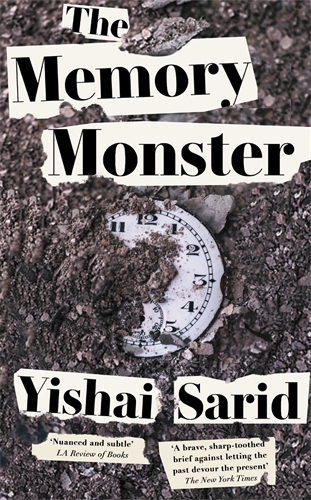You have no items in your cart. Want to get some nice things?
Go shopping
Yishai Sarid’s unnamed narrator is “a loyal, industrious agent of memory.” He guides groups of schoolchildren around the death camps of Nazi Germany. He describes a world where process is king, not God, and where there is a sneaking admiration for efficiency. This is a brave and brilliant short novel translated to great deadpan effect in which we find a sensitive man driven half-mad by the industrialisation of memory.
This young, Israeli narrator is a PhD graduate in Holocaust Studies employed by the Yad Vashem Holocaust museum in Jerusalem. As a tour guide around the preserved death camps of Poland, he describes the extermination of Jews in detail, trying to spark a response in young Israeli minds attached to smart phones. He then watches these same young people ritualise their response to what they have witnessed, by draping themselves with the Israeli flag, singing patriotic songs and lighting candles. He is asking for soul-searching in his audience and what he gets is sentimentality. As such, he is horrified at the disconnection between memory, emotion and remembrance.
Sarid is an exciting writer. He was born and raised in Tel Aviv. He served as an intelligence officer for the Israeli Defence Force and is now a lawyer. Alongside his legal practice, he has written six novels, which have been translated into ten languages and have won literary prizes including the Bernstein Literary Award and Gran Prix de Littérature Policière. He is thus well placed to explore the moral cavities in Israel’s character. His narrator in The Memory Monster overhears one of his tourists saying, “That’s what we should do to the Arabs.” It is an “exposed reflection” he reckons. His own immersion in the thinking and logic of the Nazis is causing him too to lose his emotional bearings so that he also starts to see the world in mechanistic form. The narrator’s studious language is suffused with a rising hysterical undertone that signals a growing tension between genuine commemoration, and a collective conscience gripped with fear. As he grows more inured to the story he is telling, he commends a teenager for saying that “in order to survive we need to be a little bit Nazi, too.” The mission of bringing these young people to “the site of the murder” has been accomplished, he says. “We made you see that it’s all about power, power, power. I’m not going to play naïve or chaste. You’re right. Power. Hitting. Shooting. Annihilating the other. Because without power we’re like beasts, chickens for slaughter.”
This fear is what becomes the monster, Sarid seems to be saying. It also seems that he is warning his compatriots of a growing peril via a narration that takes the form of a letter. The letter is addressed to the head of Yad Vashem. From the start our narrator’s letter has an exculpatory tone indicating that he is guilty of some misdemeanour. Guilt drives the story on so many levels, it is not surprising that the narrator falls apart.
He describes his introduction to Holocaust Studies as a choice driven not by desire but expedience. Taking up Holocaust Studies is the easiest route into academia and a steady income. Through his narrator’s job, Sarid exposes the horrors of the Holocaust as both statistical analysis and witness testimony. The detail is excruciating, the desire to heal these terrible wounds is real. But there are larger, social forces at work. The narrator is seconded by Yad Vashem to act as consultant for a tech outfit that is constructing a virtual reality “educational” game. In this game participants can play any of the roles involved in genocide. His role is to make the experience more realistic. As his career progresses, the reader senses his commitment dimming. Instead of receding into cynicism or becoming bloated with self-importance, he watches with increasing bewilderment as industry co-opts the tragedy of lived experience. Finally, and bizarrely, he is employed by the Israeli military to help stage an anniversary event in which commandos will seize a Polish extermination site as a demonstration of Israeli force. This is based on true events. In 2003, Israeli F-15 fighter jets, piloted by the descendants of Holocaust survivors, carried out a flyover over Auschwitz – the once powerless now desperate to show off their power, even to ghosts.
In effect, The Memory Monster is clever, funny, disturbing and tragic. At one point, we are offered a glimpse of our narrator’s home life. His detached stance is never more effective than when he is describing intimate moments such as this. He has an infant son who asks him what his job is. His wife says, “He tells [people] what happened.”
“What happened?” Ido widened his eyes with worry.
“There was a monster that killed people,” I said.
“And you fight the monster?” he asked, excited.
“It’s already dead,” I tried to explain. “It’s a memory monster.” In succinct terms, this is exactly the point Sarid is making. We need to be wary of the monster, because, the last thing we learn from our narrator’s extended apology, is that it bites.
By Yishai Sarid
Translated from the Hebrew by Yardenne Greenspan
Serpent’s Tail, 176 pages
LILIAN PIZZICHINI
With a background in teaching and journalism, Lilian Pizzichini is the author of Dead Men’s Wages (winner of 2002 Crime Writers’ Association Gold Dagger for Non-Fiction) published by Picador. In 2009 Bloomsbury published The Blue Hour: A Portrait of Jean Rhys (BBC Radio Four Book of the Week) and in 2014, Music Night at the Apollo: A Memoir of Drifting, a Spectator Book of the Year. Her fourth book, The Novotny Papers, was published by Amberley in May 2021, and featured in The Daily Telegraph and Daily Mirror's "Big Read".




